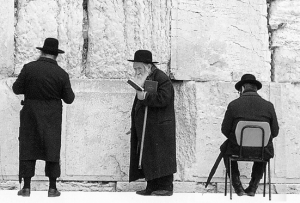 All the great Rabbis of this generation have proclaimed that we are in a period called in the Talmud “the footsteps of Mashiach / Messiah”. It is a period in which turmoil among nations will be common.
All the great Rabbis of this generation have proclaimed that we are in a period called in the Talmud “the footsteps of Mashiach / Messiah”. It is a period in which turmoil among nations will be common.
Advent of Messiah
Rabbi Chaim Kanievsky, one of the Greatest Rabbis in the Generation, has exhorted Jews to return to Israel. He said to someone recently visiting him from Lakewood “Stay in Israel.” The Rabbi replied – but I am in charge of over 700 students in Lakewood.” He replied “If you don’t come now, it will be hard to find place on the airplanes to get here.”
Some stock experts are predicting the downturn of stock markets and the economy. Some are saying to prepare for survival – by stocking up on water or knowing how to produce water. (One simple method to distill water is to take a bowl, a cup, plastic wrap, a stone and salt water. Put salt water in bowl outside in the sun and put cup in the middle. put plastic wrap on top of bowl. Put rock on plastic wrap. Evaporated water will condense on plastic wrap, and drip into cup.) The best way is to prepare oneself spiritually.
There are ways to avoid the difficulties of this time and survive the storm.
Repentance and Yom Kippur – Opportunities to Clean the Slate
The 4 Steps of Repentance are
1. Regret – regretting what one did. Obviously one has to know what is right and wrong to regret. If one thinks stealing is right – they will not regret. To find out what is right and wrong – A Jew repents by looking at the 613 commandments or the Shulchan Aruch / code of Jewish Law – that regulates Jewish life. A gentile starts the process by looking at their the 7 Noahide Laws.
2. Cessation – Stopping doing the misdeed
3. Confession – Admitting to G-d / Hash-m the wrong that one did and asking for forgiveness
4. Commitment – Committing not to do the transgression again. One know one is forgiven if he or she finds oneself in the same situation and does not commit the impropriety
Repentance for things done against ones fellow must be accompanied by asking for forgiveness. Yom Kippur forgives transgressions against G-d. But to receive pardon from transgressions between man and man, one must ask for forgiveness.
If you are holding a grudge – let go. Forgive and forget and G-d will forgive you. Don’t speak badly about others and the accusers in Heaven will not speak about you.
Cleansing Oneself with Water
Water distillation is like the process of Teshuva / repentance. The pure water rises. When we set our sights towards being good and doing the will of G-d – we purify ourselves. The pure goes up and the bad deeds remain down. Thus we purify ourselves and wipe the slate clean.
One who learns Torah – which is compared to water – as its study cleanses a person – will gain special protection. (note: There are only certain parts of the Torah that Gentiles can learn – a gentile who learns about the 7 Noahide laws is praiseworthy. Other parts of Torah – that a gentile may learn – one must inquire by a competent Torah Jew or Orthodox Rabbi.) When one fills oneself with the wellspring of Torah G-d will offer them special protection.
On Rosh HaShannah we are compared to Sheep. To decide which sheep were to be offered on the Altar – they were placed in a fenced area with a passage to another. As each sheep would pass through they were counted. The 10th sheep would be marked with a red mark. If a sheep was smart – if it wanted to get out of being offered – they could jump into water and wash away the red mark. We too have a chance on Yom Kippur to repent and wash away our past failings.
What many people forget are three things:
1. The Paths of G-d are Pleasant -The pleasantness of following Torah, of being close to G-d, of raising righteous children of having a positive marriage cannot be explained in this short article. G-d is our Father and wants our happiness. G-d knows the true path to happiness – He did make humankind. Like a father, He wants a child to enjoy a fulfilling relationship with Him. Thus he gave the Torah. Some think that if I follow Judaism I will be subject to restrictions. They overlook that – on the contrary, the guidelines are to give a person more pleasure.
2. Any Physical punishment that occurs to a person or nation is because they did something spiritually wrong – according to Torah. For instance people who worship Idols – like an object, or man, or a tree – will be punished because they disregarded the Noahide law prohibiting idol worship. So if a person, changes their ways to correspond to the Torah’s laws they can avoid punishment. The punishment can be used to propel the person to make amends with G-d or can be wasted by ignoring its spiritual message to improve ones ways.
3. Each person has freedom of choice to change for the better – no matter where a person is terms of their level in Torah observance – Jewish or Gentile they can repent and be forgiven by G-d. (A gentile / non-Jew need not convert to Judaism to follow Torah they just have to follow their Noahide laws as outlined in the Torah.) Once someone said to me “I am unworthy of doing good.” I should have responded “The fact that you feel unworthy means that you have good inside you – meaning you are very worthy.” Every person can better themselves.
Settling of Accounts
The goal of the Messianic period is to settle accounts before the world reaches its true perfection. True perfection means that peace will reign in the world and people will recognize the G-d of the Jews as the true G-d.
Apparently if all the people choose to follow the G-d of the Jews – they will survive. If they don’t they may not. Thus this time is a proper time to do Teshuva / repent. A non-Jew repents by abandoning their old ways and follow the 7 Noahide commandments. A Jew repents by following the Torah – as explained by the Shulchan Aruch / code of Jewish Law – that regulates Jewish life.
All those nations and individuals that tormented the Jews will be punished. All those that were good will be rewarded – possibly with their survival.
The Torah has prophesies about what will happen in these times. (Talmud : Sanhedrin 97a). In Torah there are accepted ways to interpret verses from the Five books of Moses and verses that are interpreted in the Oral Torah – including the Talmud.
The Prophesies stated can be interpreted for the good or for the “will be good”. America is called a Malchut Shel Chesed – a government of Kindness. It has done kindness with other nations that no other nation has done.
Yet America does have its failings – One such failing is the legitimization of same gender marriage. G-d hates improper marital relations.
Midrash Rabbah (26:9) tells us that “The generation of the Flood was not wiped out until they wrote marriage documents for the union of a man to a male or to an animal.”
Another Such failing is that America is the reincarnation of Rome. Rome committed terrible atrocities against the Jewish people. Now G-d wants to settle the accounts.
According to one Rabbi in the Talmud – which was originally the Oral law, given to Moses at Mount Sinai by G-d – There is a prophesy (Talmud Yoma 10a) that says “Iran / Persia will overtake Rome (ie, America).” Another says that “Rome will overtake Iran.” Apparently it could go either way. Either scenario is feasible, now that Iran has gone Nuclear. If America plays its cards right – it could possibly be saved.
How? G-d basically wants people to follow the Torah – Jews and Gentiles. The Torah says that all people are to follow the 7 Noahide laws, because G-d in the Torah that he Gave to Moses said so. For some it will mean abandoning their physical gods or god of materialism. For some it will mean they must abandon their hatred of the Jews. All apparently will have to follow the laws to survive.
G-d does not want the death of the wicked. He wants them to abandon their evil ways and become righteous. Thus any person, who wants to be saved has a way of survival – to follow the laws of the Torah and they will be considered righteous and thus likely be saved.
The Torah says for “To avoid the pains of before the Messiah, a Jew should scrupulously observe having the 3 meals on Shabbat”
The Ben Ish Hai interprets certain prophesies in the Torah – in a positive manner. Others Interpret it in a way that are pretty scary and we see the signs of that that is happening. One such sign is that if the Jews do not repent G-d will appoint a ruler, like Haman, to force them to change their ways by his evil decrees.” But it doesn’t have to be such. If Each Jew takes upon themselves some principal commandments – like observing the Shabbat / Sabbath & Keeping Kosher and observing family purity – they will probably be saved.




 Fishbone Diagram on Time Wasters
Fishbone Diagram on Time Wasters